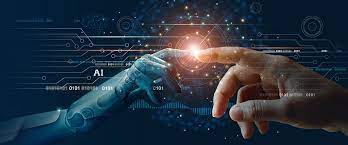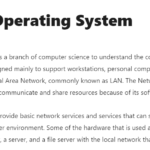AI is a branch of sciences in the computer which is trending in relation to work with smart machines. These machines are capable of performing tasks that require human input more efficiently. Machine learning powers almost all the programs in AI. Artificial Intelligence falls under 2 categories mainly:
Narrow Artificial Intelligence: This category of AI works only with a limited context. This category might perform a single task very efficiently but cannot perform multiple tasks together. Other than this, they have more constraints.
Artificial General Intelligence: you might have seen movies such as Westwood, data, etc where the machine is similar to a human being only performing all the tasks very very efficiently. They can solve any issue.
Types of Artificial Intelligence
There are 4 types of AI that can perform human-like functions:
Relative Machines: These are old forms of intelligent systems that have extremely limited capacity. They emulate the human mind’s ability to respond to different kinds of stimuli. These machines do not have memory-based functionality which means such machines cannot use previously gained experiences to inform their present actions. These machines do not have the ability to “learn” but only “perform”. The machines could only be used for automatically responding to a limited set or combination of inputs and cannot be used to rely on memory to improve their operations.
Limited Memory: Limited memory machines are machines that have the capabilities of purely reactive machines, are also capable of learning from historical data to make decisions. All present-day AI systems, such as those using deep learning, are trained by large volumes of training data that they store in their memory to form a reference model for solving future problems.
Theory of Mind: Theory of mind AI is the next level of AI systems that researchers are currently engaged in innovating. A theory of mind-level AI will be able to better understand the entities it is interacting with by discerning their needs, emotions, beliefs, and thought processes.
Self-Aware: This is the final stage of AI development which currently exists only hypothetically. AI is self explanatorily and has evolved to be so akin to the human brain that it has developed self-awareness. Creating this type of AI is and will always be the ultimate objective of all AI research.
Applications of Artificial Intelligence
- AI can quickly diagnose any disease or medical issue which is a very positive step towards the patient’s recovery.
- It has a huge amount of data in collaboration with data mining. Scientists use it to extract patient’s data in the field of health care.
- This helps to explore areas widely and in a better way through a lot of images and information records. That is how it is helping to save dugongs.
Future of Artificial Intelligence
Artificial intelligence is an awesome new tool to have in our toolkit, no matter which science way we go. It allows us to do things like process huge amounts of data quickly. It can get the answers to our research questions much faster in every way.
Because we can scale computation power much faster than human brainpower, this allows discoveries to happen at an increasing pace.



